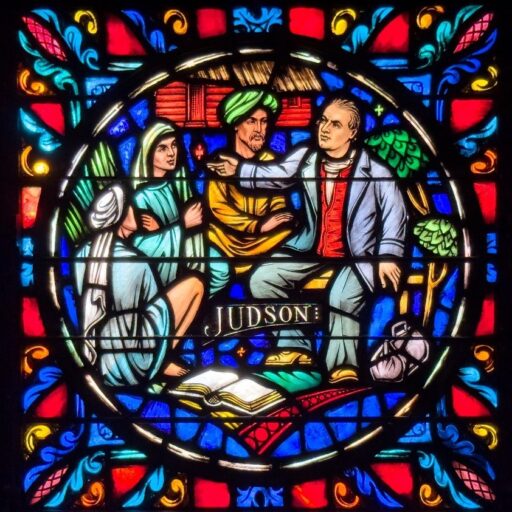1819-1850
Nancy Judson McCoy
Special Daughter IN/MO
To get a glimpse of Nancy Judson McCoy it is necessary to know her parents, Isaac and Christiana McCoy. Biographer Walter N. Wyeth describes Isaac McCoy as, “the pioneer, the Judson of the West, who enjoys the honor of arousing the people of God, and of the land generally to their duty to a neglected and misused race.”[1] McCoy was a missionary to the Indians appointed by Baptists in 1817 at the second meeting of the Triennial Convention. At their first meeting, three years prior, the Baptists assumed the appointment of Adoniram Judson, Jr., as a missionary to Burma.[2]
Nancy Judson McCoy was born to Isaac and Christiana McCoy on 26 February 1819, the ninth child to come from this marriage. Before becoming a missionary to the indigenous Indians of America, Isaac McCoy was pastor of the Maria Creek Baptist Church in southwestern Indiana (1809-1812) where he engaged the moral crises of the day by refusing church membership to slaveholder Peter Hansbrough.[3] McCoy worked with indigenous peoples in Michigan, Indiana, Kansas and Missouri and was involved in the founding of both Grand Rapids, Michigan, and Kansas City, Missouri.
Isaac and Christiana already had birthed 8 children when they left Maria Creek and moved to Raccoon Creek, Indiana, to begin ministry among the Native Americans.[4] The first child born in this new locale was named Nancy Judson McCoy using the pet name “Nancy” which was often applied to Ann Hasseltine Judson. She seemed to be a normal child but early in life contacted a debilitating fever. Her father reported:

A young daughter [Nancy] long lingered in a nervous fever, exceedingly low; her nerves ever after remained so much affected as to render her incapable of taking care of herself, and this continued affliction of a dear child, once among the most sprightly of our children, has been a source of anxiety exceeding all others which belong to the ordinary matters of our life.[5]
In a biographical sketch of Christiana Polke McCoy, historian Gary W. Long provides a few snippets of Nancy Judson McCoy’s life.
+My daughter, Nancy Judson McCoy is mentally and physically incapable of taking care of herself, her mind and the proper use of her limbs are impaired we believe by a nervous fever…previously she appeared to possess common activity of body and sprightliness of thought…[6]
In 1831 when her son Charles died, “a bereaved Christiana was also taking care of the other small children, which included their handicapped daughter Nancy.”[7] Later that year the family moved to Oklahoma Territory where Christiana had to make the most of a very difficult situation “plus the special attention needed for her daughter Nancy.”[8] By May of 1833, seven of Christiana Polke McCoy’s children had died and two were married leaving her with “…one daughter physically handicapped.”[9] From Westport, MO, on 20 April 1840, Christiana wrote to her husband, “Nancy has got over her melencholly [sic] and is now on the other extreme. She talks and laughs incessantly.”[10] Late in 1842, Isaac McCoy and wife Christiana moved to Louisville so that the elderly missionary could form the American Indian Mission Association (AIMA) taking with them “their invalid daughter, Nancy, who is now 23 years old…”[11] Upon the death of her husband, Isaac, Christiana’s family suggested she move in with her widowed brother-in-law because “it would be a good idea and a great help to Christiana who often found it difficult to manage her invalid daughter, Nancy.”[12]
She is exceedingly troublesome and crazy at times, especially when there is a storm, Aunt (Christiana) then can hardly manager her. She will mind a man without any trouble…[13] Sometime in the spring or summer of 1850,.. her dearly loved and handicapped daughter, Nancy died.[14]
Nancy Judson McCoy was probably buried in the McCoy Cemetery at the southeast corner of State Line Avenue and 51st in Kansas City, MO. If so, those remains were removed to Union Cemetery by the J. C. Nichols Company in 1916.[15]
+++++++++++++++
[1]Walter N. Wyeth, Isaac McCoy Early Indian Missions. Isaac McCoy-Christiana McCoy, A Memorial (Philadelphia: W. N. Wyeth, Publisher, 1895), Prefatory Note.
[2] Judson (1788-1850) and McCoy (1784-1846) were contemporaries and both were appointed by the General Missionary Convention of the Baptist Denomination in the United States of America for Foreign Missions (Triennial Convention) in 1814 and 1817 respectively. Though they never met, McCoy had learned about Judson and used Judson’s work among the Karens of Burmah as an example of the difficulty in codifying languages. Isaac McCoy, History of Baptist Indian Missions, Expanded and Illustrated Edition (Springfield, Missouri: Particular Baptist Press, 2003), p. 475.
[3] William Taylor Stott, Indiana Baptist History, p. 54.
[4] Gary W. Long, “Christiana Polke McCoy,” A Noble Company: Biographical Essays on Notable Particular-Regular Baptists in America, Volume 8, Terry Wolever, editor (Springfield, MO: Particular Baptist Press, 2016), p. 499.
[5] Ibid., p. 500.
[6] Ibid.,
[7] Ibid., p 509.
[8] Ibid., p. 510.
[9] Ibid., p. 511.
[10] Ibid., p. 521.
[11] Ibid., p. 523.
[12] Ibid., p. 526.
[13] Ibid.
[14] Ibid., p. 529.
[15] Ibid., p. 532.
